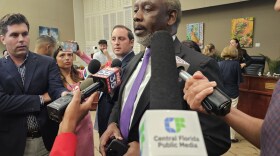Brevard County is at the center of Florida’s locally acquired dengue fever cases. As of last week, the state reported 27 cases.
“That’s a first for Brevard,” said Joseph Faella, the director of Brevard County Mosquito Control. “We have travel cases pretty much every year… But still nothing like this.”
Last year, Brevard reported eight travel-associated cases compared to only two so far this year. The surprise has been the local transmission, of which 11 of those 27 cases were reported last week.
A mosquito-borne illness alert was issued in Brevard at the end of July, when the county reported six cases. Miami-Dade is also under a mosquito-borne illness alert, having currently reported six cases. Pasco and Hillsborough counties each reported one case, and are under mosquito-borne illness advisories. An advisory indicates “increased” mosquito-borne illness activity. An alert indicates there is ongoing local transmission.
According to the state Department of Health, Florida is on par with last year, having reported 35 cases of the illness being transmitted locally at this point in the year. Ultimately, Florida ended 2024 with 85 locally transmitted cases.. Last year was an exceptionally active time for travel related cases, totaling 911-- four times what experts expected.
This year, the wet season, which is when mosquito breeding really buzzes, was off to a slow start in Brevard County, Faella said, until June. That’s when the first local dengue case was reported.
“At the time, they were just presumptive cases. And then by the end of June, we had our first confirmed case,” he said.
Dengue, also known as “bone-break fever,” is transmitted via mosquito bite and can cause fever, vomiting, and painful body aches. For the virus to spread in Florida, a person would have to travel to or from a dengue-endemic country (such as Cuba or Brazil, where dengue naturally occurs locally) and be bitten by a specific mosquito (Aedes aegypti) carrying the illness while abroad.. Once back in Florida, that person would need to be bitten again by an Aedes aegypti mosquito that carries dengue. That same mosquito could then become a vector spreading the illness to anyone it bites.
Why dengue is in Brevard
It’s still too early to say exactly why, but dengue appearing in Brevard wasn’t unexpected, Faella said.
“I would say that the way climate trends are going, we were thinking at some point this could be an issue, but we were just not thinking so soon,” Faella said.
Aedes aegypti typically thrives in a more tropical climate than Florida, but things are changing in Florida, Faella said.
“This is something that you would see in more tropical regions. So in a way, you know, it's, it's us becoming more tropical,” he said. “You're seeing the red mangrove species, for instance, more dominant than before. You see sea grapes, which are usually kind of smaller, more of a shrub. On the north end, you see them getting larger.”
Historically, red mangroves are more dominant in South Florida.
What’s being done about it
The 27 dengue cases have been reported in Brevard. While the number is low, Faella suspects that more people have probably been infected. The 27 were the ones sick enough to seek medical help.
Faella and his team have been going to areas both suspected and confirmed to have dengue mosquitoes or patients and applying EPA-approved treatments as well as setting traps. Inspectors have also been sent to neighborhoods looking for containers carrying water, some as small as bottle caps, as well as blocked up gutters – all of which are potential breeding grounds.
What makes tracking down Aedes aegypti tricky is its small breeding ground. The mosquito doesn’t typically fly beyond 1,500 feet from where it breeds. Finding the exact spot where they may be breeding is a small target.
“And assuming that we may not be hitting the exact spot they’re in. The wind could have blown them over a little bit,” he said.
As for residents, Faella advises them to dump any water containers outside. And if they are experiencing mosquito problems, call one of two numbers depending on your location.
Phone (North of Wickham Rd.)(321) 264-5032
Phone (South of Wickham Rd.)(321) 952-4523
You can also visit Brevard County Mosquito Control’s website for more information.






